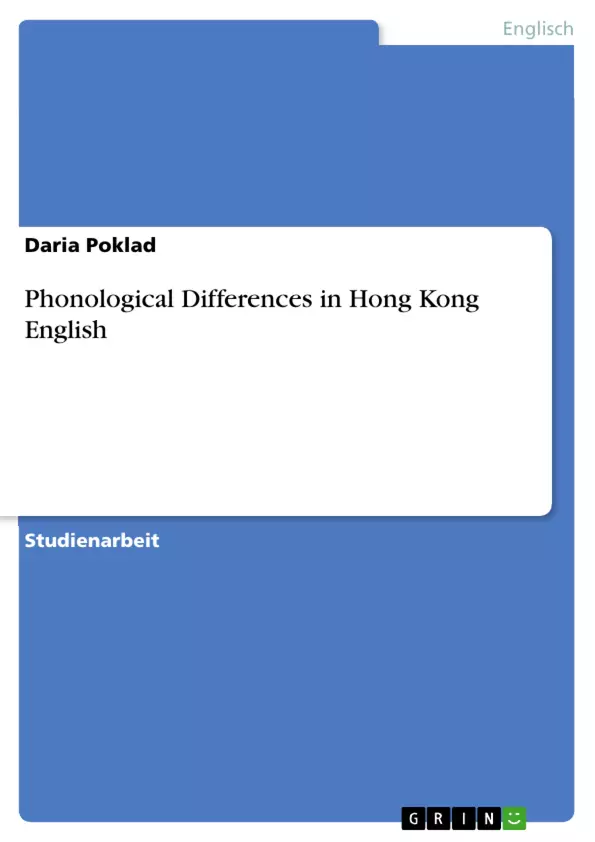The following paper deals with the phonological differences in Hong Kong English in comparison to Standard English. First I will present a general view of the language situation in Hong Kong. Then in the third chapter some of the main phonological variations existing in Hong Kong English will be presented. In a further step, I will analyze if these variations can be found in two interviews with Hong Kong-born actor Jackie Chan who has lived and worked several years in the United States and examine how they differ from Standard English, before summing up the results in the conclusion.
Hong Kong came under British control as a result of the Opium Wars with China from 1839 to 1842 and from 1856 to 1860 and developed since then as a trading centre. Throughout the British colonial period from 1842 to 1997 a minority of British administrators and traders co-existed with a large majority of Chinese traders and laborers. Since most Chinese could speak Cantonese, there was no need for a lingua franca, but only for a language to use with influential foreigners (Melchers 163). Therefore the knowledge of English was spread almost entirely through the education system, which increasingly used English as a medium (ibid.). In 1997 Hong Kong was returned to Chinese sovereignty. Today, English is very widely used in the educational and legal system and for dealing with international business partners (ibid. 164). Moreover, English is becoming ‘localized’ and is used to some extend for everyday interaction among locals who all speak Cantonese (ibid.).
Nevertheless, the English spoken in Hong Kong differs in regard to grammar, lexis and phonological aspects from Standard English as Received Pronunciation (RP) or General American (GA).
Inhaltsverzeichnis (Table of Contents)
- Introduction
- The language situation in Hong Kong
- Phonological differences in Hong Kong English
- Voicing contrasts and glottal stops
- Final consonant cluster simplification
- Initial consonant cluster simplification
- Dental fricatives
- The /I/-vocalization
- The /n/-/l/ merger
- Diphthongs followed by consonants
- You pronounced [tfu]
- The vowel inventory
- Compound and sentence stress
- Analysis of the Jackie Chan interviews in terms of phonological differences in his Hong Kong English
Zielsetzung und Themenschwerpunkte (Objectives and Key Themes)
Der Artikel befasst sich mit den phonologischen Unterschieden zwischen dem in Hongkong gesprochenen Englisch und dem Standard-Englisch. Er analysiert die Sprache des Hongkonger Schauspielers Jackie Chan und seine Verwendung spezifischer phonologischer Merkmale im Vergleich zum Standard-Englisch.
- Die sprachliche Situation in Hongkong
- Phonologische Unterschiede in Hongkong-Englisch
- Die Bedeutung von Vokal- und Konsonantenrealisierung
- Die Rolle der Konsonantencluster-Vereinfachung
- Die Analyse der Sprache von Jackie Chan
Zusammenfassung der Kapitel (Chapter Summaries)
Das erste Kapitel stellt die sprachliche Situation in Hongkong dar. Es beschreibt die drei offiziellen Sprachen (Kantonesisch, Englisch und Putonghua) und die beiden Schriftsprachen (Standard-Chinesisch und Englisch), die in Hongkong verwendet werden. Das zweite Kapitel befasst sich mit den phonologischen Unterschieden zwischen dem in Hongkong gesprochenen Englisch und dem Standard-Englisch. Es werden verschiedene Merkmale, wie die Verwendung von Vokalen und Konsonanten, Konsonantencluster-Vereinfachung und die Betonung von Wörtern und Sätzen, vorgestellt. Das dritte Kapitel analysiert die Sprache von Jackie Chan anhand der im zweiten Kapitel beschriebenen phonologischen Unterschiede. Es beleuchtet, wie Jackie Chan die phonologischen Merkmale von Hongkong-Englisch in seinen Interviews verwendet.
Schlüsselwörter (Keywords)
Hongkong-Englisch, Standard-Englisch, phonologische Unterschiede, Vokalrealisierung, Konsonantencluster-Vereinfachung, Jackie Chan, Sprachvariation, Sprachentwicklung.
Häufig gestellte Fragen
Was sind die Hauptmerkmale von Hongkong-Englisch im Vergleich zum Standard-Englisch?
Hongkong-Englisch weist spezifische phonologische Unterschiede auf, wie die Vereinfachung von Konsonantenclustern, Unterschiede in der Vokalrealisierung und eine veränderte Wortbetonung.
Welche Rolle spielt Jackie Chan in dieser Arbeit?
Die Arbeit analysiert zwei Interviews mit Jackie Chan, um zu untersuchen, wie diese typischen Hongkong-englischen Variationen in seiner Sprache vorkommen.
Was versteht man unter "Final Consonant Cluster Simplification"?
Es handelt sich um das Weglassen oder Vereinfachen von Konsonanten am Ende eines Wortes, ein häufiges Merkmal im Hongkong-Englisch.
Wie ist die aktuelle Sprachensituation in Hongkong?
Englisch wird weitgehend im Bildungs- und Rechtssystem sowie im internationalen Geschäft verwendet und koexistiert mit Kantonesisch und Putonghua.
Was ist der "/n/-/l/ merger"?
Dies beschreibt die phonologische Vermischung der Laute /n/ und /l/, die oft bei Sprechern aus Hongkong zu beobachten ist.
Warum verbreitete sich Englisch in Hongkong hauptsächlich über das Bildungssystem?
Während der Kolonialzeit gab es keine Notwendigkeit für eine Lingua Franca im Alltag, sodass Englisch gezielt als Medium in Schulen etabliert wurde.
- Quote paper
- Daria Poklad (Author), 2013, Phonological Differences in Hong Kong English, Munich, GRIN Verlag, https://www.grin.com/document/310859



